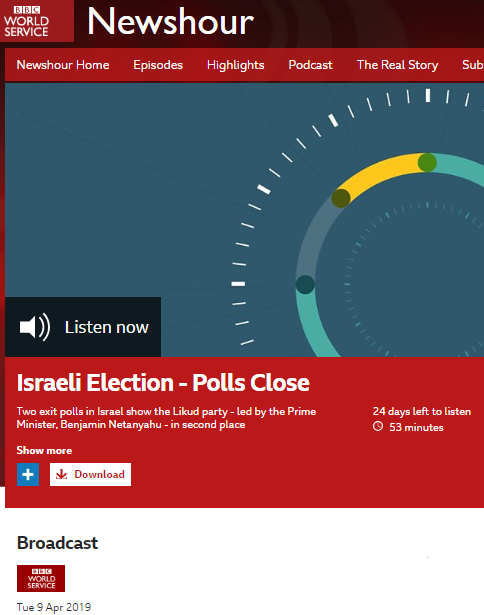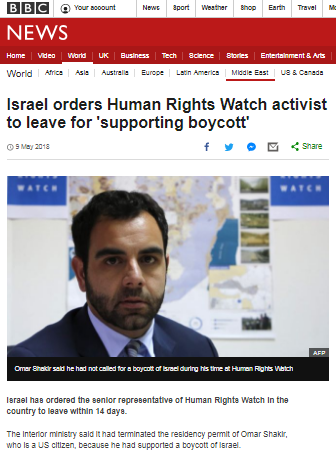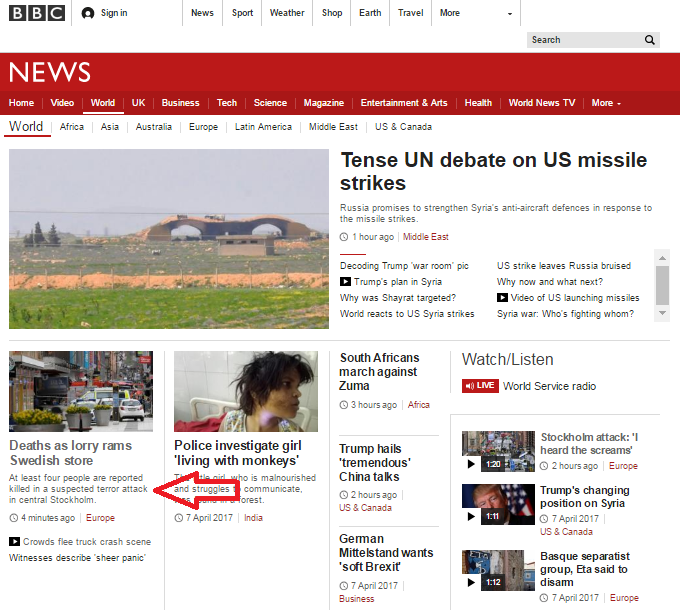On December 26th 2018 an overwhelming majority of MKs voted to dissolve the 20th Knesset and go to elections just over three months later.
“The bill for the dissolution of the 20th Knesset was given final approval by the plenum Wednesday night. The government-sponsored dissolution bill was merged with private bills submitted by MKs Robert Ilatov (Yisrael Beitenu), Tamar Zandberg (Meretz), Yair Lapid (Yesh Atid) and Ayman Odeh (Joint List).
The bill, which passed by a vote of 102-2 in its third (final) reading, also sets early elections for April 9, 2019. The MKs who voted against the bill were Yehuda Glick (Likud) and Yaron Mazuz (Likud).”
Two days earlier the BBC had correctly told visitors to its website that:
“Israel is to hold a general election in April, the ruling coalition has said.
The political partners decided to call the poll after failing to resolve a dispute over a draft conscription bill for ultra-Orthodox Jews. […]
The ruling coalition was recently reduced to holding a one-seat majority in the Knesset (Israeli parliament) after the then-defence minister resigned in protest over what he said was a weak approach towards dealing with attacks from Gaza, the Palestinian enclave bordering Israel.
By Sunday night it was clear the government faced collapse after ultra-Orthodox parties threatened to withdraw over the draft conscription bill.”
Listeners to two editions of the BBC World Service programme ‘Newshour’ on April 9th however heard a completely different account of those events from the BBC’s chief international correspondent Lyse Doucet.
In the programme’s afternoon edition presenter James Coomarasamy introduced an item (from 18:37 here) as follows: [emphasis in italics in the original, emphasis in bold added]
Coomarasamy: “Now another election now and it was an early call but was it the right one for him? Israel’s prime minister Benjamin Netanyahu will be finding out whether his decision to hold an early election today will secure him his record-breaking fifth term in office.”
In contrast to Coomarasamy’s claim that the decision to call an election was made by Mr Netanyahu alone, it was actually taken by the heads of all five coalition parties and – as seen above – endorsed by a majority of Knesset members from parties across the entire political spectrum.
After listeners had heard recordings of statements made by Netanyahu and the Blue and White list leader Benny Gantz at their polling stations, Coomarasamy brought in “Newshour’s very own Lyse Doucet who’s in Jerusalem for us”. Having mentioned the weather and voter turnout percentage, Doucet went on:
Doucet: “There’s a bit of apathy this time round because in effect this election campaign is about only one issue and that is Benjamin Netanyahu. Will he get that fifth term in office and put himself in the history books as Israel’s longest serving prime minister? So the question in this whole election is will Bibi, as he’s known, win and is Bibi good for Israel.”
Seeing as the BBC’s coverage of the run up to the election totally ignored the topic of what concerns the Israeli voter, it is of course hardly surprising that Doucet would come out with that inaccurate and superficial claim. Coomarasamy went on to suggest yet again that Netanyahu had called the election alone.
Coomarasamy: “And at the moment, I mean, he…he’s sounding confident. He sounds as though he made the right decision. I suppose, you know, this early election is…was a gamble. He’s made a gamble before and it didn’t pay off.”
Doucet: “He called early elections – eight months earlier – because he was trying to get in ahead of the attorney general but the attorney general got the best of him and has already indicated that charges are pending – corruption charge, fraud, breach of trust – and so there’s criminal investing…there’s criminal charges pending against Benjamin Netanyahu and he was hoping that he would call these elections and secure his fifth term before the attorney general filed. So this cloud is hanging over his head and what he would like to do is first of all get the high…get his Likud party to get the highest number of seats tonight – but remember: no party in Israel has ever ruled on its own – that he would then be chosen by the president to try to bring…to forge a governing coalition which will be comprised of not just Right-wing parties but far Right-wing racist parties – ah…and that’s causing some concern here – and then be able to pass a new law in the Israeli Knesset which says you can’t be charged when you’re a sitting prime minister. Israel doesn’t have that yet. So that’s the gamble really that he’s dealing with now.”
Until that point the BBC had confined itself to categorising one party – Otzma Yehudit (Jewish Power) as racist but apparently the BBC’s chief international correspondent sees no problem in branding more than one Israeli political party in that way.
Coomarasamy: “That’s his personal gamble. What’s at stake for the country as a whole would you say, Lyse?”
Doucet: “Well that is the big issue. I mean one Israeli commentator was saying that it’s not just fateful issues on the agenda, it’s the fate of the country which is on the agenda. Israel has been moving steadily to the Right over the past decades, largely fuelled by the failure of peace making with the Palestinians. It’s noticeable that that simply wasn’t an issue at all in these elections. And look at what has happened in the past year thanks to Mr Netanyahu’s greatest champion in the White House, Donald Trump. The Americans have moved their embassy to Jerusalem, they’ve recognised Jerusalem as the capital of Israel – effectively trying to take that issue off the table. They also have recognised the Golan as part of…under Israeli jurisdiction – not Syrian. So in some ways they’ve been trying to move toward resolving these issues and Mr Netanyahu even threatened or even indicated – again, in a bid to get those far Right-wing votes – that he would annex large parts of the West Bank, which takes another issue off the agenda.”
As we have regrettably had cause to note here before, despite the best efforts of BBC journalists to ignore it, the US announcement recognising Jerusalem as Israel’s capital city specifically stated that it had no bearing on negotiations between Israel and the Palestinians, noting that “the specific boundaries of Israeli sovereignty in Jerusalem are subject to final status negotiations between the parties”.
The evening edition of ‘Newshour’ on the same day – presented by Tim Franks – also included a contribution from “our very own Lyse Doucet” (from 45:05 here) in which she again paraphrased anonymous Israeli commentators.
Doucet: “…but I have to say, Tim, that the Israeli analysts are already saying this is a message to Benjamin Netanyahu that you may have snuck in again but your days are numbered.”
Franks: “Right and I suppose there would be a question also, were he to get in, just how long he might be in for because there are these corruption allegations hanging over him.”
Doucet again promoted the falsehood that Netanyahu had called an election all on his own.
Doucet: “He called this election eight months earlier than he had to. He was hoping to get a new mandate before the attorney general published or finished his investigation. The attorney general preempted him. The charges have been published – he’s facing possible indictment on three major corruption, bribery, breach of trust charges. What he wants from…if he does form a new government he will want that government to bring in new legislation which means a sitting prime minister cannot be indicted. He wants legal cover for those charges. It’s…this is quite clearly being discussed here. So it’s not just about winning these elections; it’s about winning his personal freedom as well.”
The as yet non-existent legislation touted by Doucet is known in Hebrew as ‘the French Law’ after similar legislation in France. Four days before Doucet laid out her theory according to which Netanyahu had dissolved the Knesset and called elections all on his own in order to get such a law passed, the Times of Israel reported that:
“Several political allies of Prime Minister Benjamin Netanyahu said Thursday they would not back an effort to pass a law giving the premier immunity from prosecution. […]
…several senior ministers said they would not back the law, including Public Security Minister Gilad Erdan from Netanyahu’s Likud party.
“He [Netanyahu] promised he wouldn’t try, and if a proposal like this comes up from others in the Knesset, I’ll oppose it,” Erdan told Army Radio.
Kulanu leader Moshe Kahlon, who helped torpedo a bid in 2017 by a Netanyahu ally in the Likud to pass an immunity bill, said he would continue to oppose it. “Everyone is equal under the law,” he told Army Radio. […]
Yisrael Beytenu leader Avigdor Liberman, who is also seen as a likely coalition partner for Netanyahu should he be tasked with forming the next government, also said he was against a retroactive measure.
He blamed speculation about Netanyahu seeking a measure on “the media.””
Indeed speculation on that topic was rife during election campaigning but senior BBC journalist Lyse Doucet did not report it as speculation: she reported it as fact – even constructing a supporting story about a one-man deliberate dissolving of parliament and subsequent election – without providing any concrete evidence to support her claims.
So much for BBC accuracy and impartiality.
Related Articles:
BBC Watch prompts correction to error on Israeli elections
Reviewing BBC News website pre-election coverage




